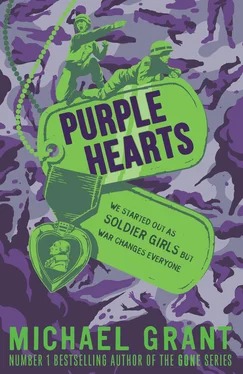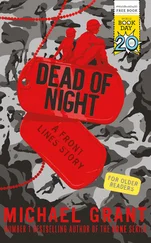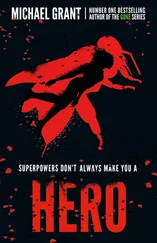“More than fourteen pounds I guess, Sergeant Richlin!”
Rio releases him. The blonde corporal mimes applause. The big corporal named Geer goes back under cover. Beebee shakes his head and mutters, “I missed the first part. Can we do it over?”
Private Rudy J. Chester gets to his feet.
“Now listen to me, the three of you,” Richlin says. “This is Second Squad, Fifth Platoon, Able Company, 119th Division. This is a veteran division, a veteran platoon. Everyone in this squad has been in combat. You have not. Therefore everyone in this squad outranks you. Are we clear on that?”
Three voices say, “Yes, Sergeant.”
“Okay.” Now Richlin allows her voice to soften. “We have a few days, at best a week, to get you ready for the real thing. The real thing will be like nothing you learned at basic. Whatever ideas you have, get them out of your head, because you know nothing.”
Three heads nod. Lupé thinks, I should have mouthed off and maybe she’d break my arm and send me home.
At the same time she thinks she’s never before met any woman who could convincingly threaten to break a man’s arm. Let alone a freckle-faced gringa who can’t weigh more than a hundred and twenty pounds.
“This is Sergeant Sticklin, the platoon sergeant,” Richlin goes on, explaining in a tone that suggests she’s talking to the slow-witted. “Here’s the way it goes: Franklin Delano Roosevelt gives an order to General Marshall who gives an order to General Eisenhower who gives an order to General O’Callaghan, who gives an order to Colonel Brace, who gives an order to Captain Passey, who gives an order to Lieutenant Horne who gives an order to Stick—Sergeant Sticklin—and then Sergeant Sticklin and I try to figure out how to carry out that order without getting you people killed. Is that about right, Stick?”
“It is,” he allows, mock-solemn.
It might be funny, but it doesn’t feel that way to Lupé. There’s something specific in the way she says killed. It’s not a word to Richlin, it’s a memory .
“Keeping you from getting killed is the main job of a sergeant. When I was a green fool of a private fresh out of basic, I had Sergeant Jedron Cole to keep me from getting killed. He kept me and Stick both from getting killed in Tunisia, and in Sicily and in Italy.”
“Many times,” Stick agrees.
“Now it’s our job to do the same for you. Maybe you don’t care about staying alive to get home again someday, but I suspect you’d prefer to stay alive, so here’s how you do that: you listen to Sergeant Sticklin. You listen to me. You listen to Corporal Geer there.” She crooks a thumb toward the big galoot who has already disappeared back into the tent. “Corporal Geer is my ASL, my assistant squad leader. He and I are going to train the living sh—stuffing out of you in whatever time we have in hopes that you can stay alive long enough to carry Corporal Castain’s extra gear.”
Still not funny , Lupé thinks. Even Rudy J. Chester looks solemn. Hank Hobart looks positively petrified.
“Now get over to Company HQ to process in,” Rio says. “When you’re done, grab some chow and get back here and Corporal Castain will get you settled. And about eight seconds after that, Geer is going to march you over to the rifle range and make sure you know which end to point at the Krauts.”
The three recruits turn and flee, not even bothering to ask where the Company HQ tent is.
But as they walk away, Lupé, who is in the rear, overhears Corporal Castain saying, “That was very good, Rio. Very Sergeant Mackie, if I may say.”
And she hears a low chuckle from Dain Sticklin.
2
RIO RICHLIN—HAMPSHIRE, UK
“Two packs of smokes and the gin,” Rio Richlin says.
The corporal, a chubby young woman with a smiling face and cold eyes, leaning insolently against a jeep, sizes Rio up. “I can get gin anywhere. Give me your knife.”
Rio makes a thin, compressed smile. “I have a sentimental attachment to my koummya ,” she says. “Besides, you wouldn’t like it. I haven’t cleaned all the blood from it yet.”
The smile disappears from the corporal’s face. She glances at the knife, then at Rio’s chest, then back at the knife. “Four packs plus the gin.”
“Done. I’ll have it back in twenty-four hours tops.”
Rio Richlin seldom wears her dress uniform, in fact, never recently, but there is one advantage in the remarkably uncomfortable get-up with its multiplicity of buttons, its impossible-to-keep-on cap and its khaki tie: in full dress one wears one’s medals.
The three stripes of the buck sergeant will impress precisely no one in a Britain neck-deep in the soldiers, sailors, coastguardsmen and airmen of a dozen nationalities. But the red, white and blue ribbon, beneath which hangs a pale gold star, is the Silver Star, (despite the baffling color of the actual star) and is given for Gallantry in Action . Quite a few Silver Stars have been handed out, but when Rio received hers it was the first time the medal had been awarded to a female combat soldier. Ever.
The star cuts down considerably on the number of leering, obnoxious, improper suggestions Rio has been on the receiving end of. Mostly you didn’t get the Silver Star unless you’d made a fair number of German and Italian widows and orphans, and that realization causes some male soldiers to . . . well, reconsider making a crude pass at Rio.
Alongside the Silver Star is a second medal, a purple ribbon above a gold heart, which has within it a lacquered purple valentine, all framing a gold profile of George Washington himself.
This is the Purple Heart, given to soldiers wounded in battle. On the back in raised letters the citation reads For Military Merit , which is a bit silly since to Rio’s mind there’s no great “merit” in getting shot or sliced up by shrapnel. But resting as it does beside her Silver Star, the combination sends a clear message in the language of the US Army: this is the real deal.
This is a combat soldier.
And that separates Buck Sergeant Rio Richlin from ninety percent of the men and women in uniform swelling the trains and roads and villages and village pubs of Britain.
The transaction complete, Rio hops in the jeep and drives away, moving fast because that’s how all the jeep drivers drive, fast, like gangsters trying to outrun the cops in a James Cagney movie.
It is forty-seven miles to the air base where Strand Braxton is based. It should be an hour’s drive at most, but the road through the damp-lovely springtime English countryside is jammed with every manner of military vehicle from jeep to truck to tank. Military Police man crossroads and try to direct traffic, sometimes in loudly profane ways, and at one point Rio is told she cannot take a particular road but must go far out of her way. Here too her medals (plus two packs of smokes and a silk scarf) convince the MP that the restriction somehow does not apply to her.
The slowness of the drive eats up hours of time she doesn’t have, and worse, leaves her free to think. Rio has a lot to think about—the imminent invasion and the role of her squad. It still seems strange to think of it as her squad. The squad, nominally twelve men and women led by a sergeant, in this case Rio, consists of her lifelong friend, Jenou Castain— Corporal Jenou Castain—as well as her long-time companions Luther Geer, Hansu Pang, Cat Preeling, Beebee, whose real name no one even remembered anymore, some replacements that didn’t yet matter, and Jack Stafford.
Jack Stafford with whom she shared a foolish kiss long ago. Jack with whom she had spent a horrible night lying in a muddy minefield, huddling together for warmth. Jack, the Brit who’d ended up in the American army. Devilish, witty, fearless Jack.
Читать дальше












